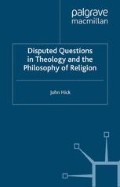Abstract
If we start from ordinary usage, we can say that interpretation is concerned with meaning, and presupposes that there is something (using that term in its most comprehensive sense to include entities, statements, actions, complex situations or indeed the universe as a whole) whose meaning is not indisputably self-evident to us. There is accordingly ambiguity, making room for alternative contruals, some of which will normally be misconstruals.
Access this chapter
Tax calculation will be finalised at checkout
Purchases are for personal use only
Preview
Unable to display preview. Download preview PDF.
Notes
The Journal of George Fox (1694; London: J. M. Dent; New York: E. P. Dutton, 1924) p. 17.
Heinrich Dumoulin, A History of Zen Buddhism, trans. Paul Peachey ([1959]; New York: Random House, 1963) p. 275.
Shankara, Crest Jewell of Discrimination, trans. Swami Prabhvananda and Christopher Isherwood, 3rd edn (Los Angeles: Vedanta Press, 1978) p. 113.
Author information
Authors and Affiliations
Copyright information
© 1997 John Hick
About this chapter
Cite this chapter
Hick, J. (1997). Religious Experience: Its Nature and Validity. In: Disputed Questions in Theology and the Philosophy of Religion. Palgrave Macmillan, London. https://doi.org/10.1057/9780230390232_2
Download citation
DOI: https://doi.org/10.1057/9780230390232_2
Publisher Name: Palgrave Macmillan, London
Print ISBN: 978-0-333-65515-3
Online ISBN: 978-0-230-39023-2
eBook Packages: Palgrave Religion & Philosophy CollectionPhilosophy and Religion (R0)

